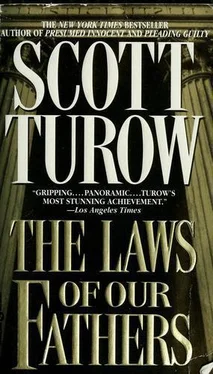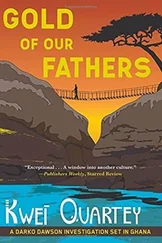Scott Turow - The Laws of our Fathers
Здесь есть возможность читать онлайн «Scott Turow - The Laws of our Fathers» весь текст электронной книги совершенно бесплатно (целиком полную версию без сокращений). В некоторых случаях можно слушать аудио, скачать через торрент в формате fb2 и присутствует краткое содержание. Жанр: Криминальный детектив, на английском языке. Описание произведения, (предисловие) а так же отзывы посетителей доступны на портале библиотеки ЛибКат.
- Название:The Laws of our Fathers
- Автор:
- Жанр:
- Год:неизвестен
- ISBN:нет данных
- Рейтинг книги:5 / 5. Голосов: 1
-
Избранное:Добавить в избранное
- Отзывы:
-
Ваша оценка:
- 100
- 1
- 2
- 3
- 4
- 5
The Laws of our Fathers: краткое содержание, описание и аннотация
Предлагаем к чтению аннотацию, описание, краткое содержание или предисловие (зависит от того, что написал сам автор книги «The Laws of our Fathers»). Если вы не нашли необходимую информацию о книге — напишите в комментариях, мы постараемся отыскать её.
The Laws of our Fathers — читать онлайн бесплатно полную книгу (весь текст) целиком
Ниже представлен текст книги, разбитый по страницам. Система сохранения места последней прочитанной страницы, позволяет с удобством читать онлайн бесплатно книгу «The Laws of our Fathers», без необходимости каждый раз заново искать на чём Вы остановились. Поставьте закладку, и сможете в любой момент перейти на страницу, на которой закончили чтение.
Интервал:
Закладка:
Yet living with her, I found Sonny full of mysterious, molten emotions that seemed to defy both her understanding and mine. She was inclined to manic spells, isolated periods of zombie-like staring, as well as adolescent attachments: writers, classmates, clothes that were one week's passion and then were never spoken of again. And she was touchy. Criticisms from professors about papers, or even their disagreement with a remark she offered in class, could make her funky and combative with me. Listening to her at those loathsome departmental parties, I was struck eventually by the way she presented herself as largely sui generis – never any mention of a hometown, or of a childhood in which her father, Jack Klonsky, secretary of the bargehandlers' local, had died in a dockside accident before she was two and in which she thereafter had been traded back and forth to the household of her Aunt Henrietta while Zora traveled and organized. Like a sculpture, Sonny presented no apparent access to her interior space. Desperate for any handhold, I would sometimes study her class notes when she was not around, or inspect the marginalia in the books she read, the passages she highlighted. What was I to make of that exclamation point? What insight made her write ‘I see'?
On no subject was she more confusing than school. At times, she was preoccupied by her department and its hothouse politics, the arch proclamations of her young adviser, Graeme Florry, and the complicated realms of thought she was required to master for her classes. Then periods would set in when she declared it all a waste of time. Philosophy was only about words, she'd say, or she'd repeat an observation of Nietzsche's disparaging the philosophic enterprise. In the catchword of the day, philosophy was no longer 'relevant.' For Aristotle, philosophy and science were one and the same. Now, she said, there were a thousand other fields of study, from psychology to physics, that we depended on to tell us more about the truth.
'It's real things, doing things I admire,' she told me, 'not ideas about them. That's what I'm trying to say. I can't live like this, talking about imaginary categories or making more of them than they really are.'
Often enough, as a means of encouraging her, I asked her to digest her reading for me, like a mother bird chewing and feeding this heavy stuff to me in lightweight bits. In order to speed the degree process, Modern Critical Thought required all students to complete a dissertation proposal by the end of the first term, which meant the work began at once at a furious pace. Sonny's emerging thesis concerned a philosopher named Brentano, who taught that consciousness was, at root, images shorn of all abstractions. Sonny was going to treat him as the unsuspected bridge between the depth psychologists, like Freud, and existentialists such as Sartre. In this connection, she was rereading the nineteenth-century German philosophers. One of her passing fixations was a term – from Nietzsche, I think – traumhaft, a sense that all beliefs – religion, love, the golden rule – were but a dream with no provable justification in morality or science. Our lives, Nietzsche claimed, our customs, were really no more than rote learning. We were, he said, actually afloat within sensation and otherwise unanchored, free but terrified, like the moonbound astronauts had been when they left their capsules and stood in space.
'Get it?' she asked. It was a Sunday afternoon, and we were, as was often the case on Sundays, in bed. It was our time of refuge before the forced march of the week began again. Sonny did not dress all day. We ate brunch and sometimes even dinner on the Goodwill mattress on the floor. In alternating periods, we went through the paper and screwed. When she dozed, I took up the sections she'd been reading. In the afternoons, Sonny moved on to her assigned texts.
'Heavy,' I answered. 'Very heavy. But bullshit.'
'Why is it bullshit, baby?'
'Cause that's not how it is. Not for me. I mean all this raging volcanic shit, I feel? Everything's connected to everything else. The draft. My parents. The war. You. I'm not floating. Not hardly. Are you?'
There was a round window, like a porthole, in our bedroom. Its existence had seemed a typically pointless Victorian frill until a night, a week ago, when the full moon had appeared there and filled the room with light so ghostly but intense I'd found it difficult to sleep. Lost in reflection, Sonny looked in that direction now.
'That's what I feel,' she said. 'A lot.' 'Traumhaft?' 'Traumhaft. There are times when I wonder. Do you know Descartes? Sometimes I wonder about everybody else. Like Descartes did. How do I know they're not in my imagination? How do I know for sure there's anything besides me? And even so, I wonder if I can really reach what's outside of me. There seems such a terrible abyss. Even between what I feel and what I can say about it. I can't -'
'What?'
'Get out? Does that make sense?' She scrutinized me with her searing, dark-eyed look. 'Am I too weird?' 'Not compared to me.' 'No. Really.'
'For-real,' I answered. 'Listen, I'm here. I promise, man.' I took her hand. 'This is here,' I said and fell upon her.
Sex was often the answer. It remains the most intensely physical relationship I've known. Words were the instruments of critical scrutiny to Sonny and talk, therefore, was as dangerous as a game of mumblypeg. In bed, she was somehow freer to give what remained often inaccessible. She was a willing participant in most of the experiments I concocted from a lifetime of unsatisfied fantasies: feathers and vegetable scrubbers; a large red dildo that briefly entered our lives. Our favorite was a tantric exercise we called The Touching Game. Naked and stoned, we faced each other in the dark, our eyes closed, legs folded yoga-like. The rules allowed us to touch with fingertips only – our bodies could not meet. No brushing knees, no kisses. And the genitals were out of bounds; they could not be caressed until some aching point when it became irresistible. Instead, we drifted our hands across each other for endless periods. I shivered when she stroked the skin behind my knee, my toe tops. We would fall, for long pieces of time, into the quivering zone above each other's lips, out of our minds with drugs and sensation, our mouths a breath apart as we trembled on the vapor of each other, of our beings.
In the Eddgars' apartment, the hot-blooded personalities of the revolution came and went: the Progressive Laborites in their workingman's twills; the leader of the Campus Employees Collective, Martin Kellett, with his sloppy redheaded ringlets; and, of course, the famous Black Panthers from Oakland, turned out in shades and berets and their three-buttoned coats of shining treated leather. The most prominent of the Panthers was Eldridge Cleaver. More often, he was represented by Cleveland Marsh, equally famous in Damon, where he had been a college football star. Currently the Panther Party's Minister of Justice, Cleveland was a hulking guy with a terrifying, insolent look. He was a classmate of Hobie's in the entering law-school class, and Hobie, a notorious sucker for celebrities, was forever rushing into the hall whenever Cleveland appeared, the better to fortify their minimal 'Hey, man' relationship.
The members of One Hundred Flowers appeared at the Eddgars' for meetings or occasionally arrived individually at odd hours to whisper with Eddgar on the back porch about some intrigue too sensitive for the telephone. Eddgar was obsessed with security. He assumed, probably correctly, that his organization and he were the constant targets of intelligence gathering and infiltration. That was why he'd removed Nile from a local baby-sitting co-op years before and barred me from his home the day we met. Once daily, the Eddgars swept the apartment for bugs. June used a device called a Private Sentry which looked like a voltmeter with a lightbulb attached, and Eddgar backstopped her, plugging a microphone into an AM-FM radio and his TV set. He chattered constantly – usually sayings from The Little Red Book – playing the channel knob across the U HF band or the full radio spectrum, awaiting any telltale feedback.
Читать дальшеИнтервал:
Закладка:
Похожие книги на «The Laws of our Fathers»
Представляем Вашему вниманию похожие книги на «The Laws of our Fathers» списком для выбора. Мы отобрали схожую по названию и смыслу литературу в надежде предоставить читателям больше вариантов отыскать новые, интересные, ещё непрочитанные произведения.
Обсуждение, отзывы о книге «The Laws of our Fathers» и просто собственные мнения читателей. Оставьте ваши комментарии, напишите, что Вы думаете о произведении, его смысле или главных героях. Укажите что конкретно понравилось, а что нет, и почему Вы так считаете.












